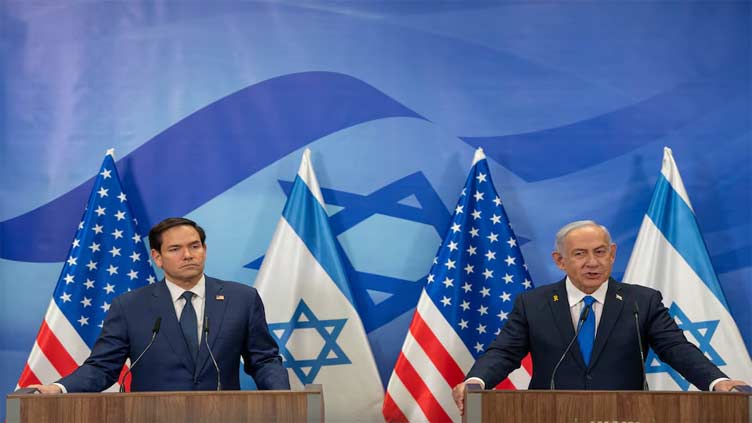Netanyahu says we can finish the job against Iran after meeting Rubio

World
Israeli-Iranian enmity stretches back decades through a history of wars
JERUSALEM (Reuters) - Israel and the United States are determined to thwart Iran's nuclear ambitions and its "aggression" in the Middle East, Israeli Prime Minister Benjamin Netanyahu said on Sunday after meeting US Secretary of State Marco Rubio.
Speaking after meeting Rubio in Jerusalem, Netanyahu said they had held a "very productive discussion" on a number of issues, "none more important than Iran".
"Israel and America stand shoulder to shoulder in countering the threat of Iran," he said. "We agreed that the ayatollahs must not have nuclear weapons and also agreed that Iran's aggression in the region must be rolled back."
Rubio said: "Behind every terrorist group, behind every act of violence, behind every destabilising activity, behind everything that threatens peace and stability for the millions of people that call this region home is Iran."
Israeli-Iranian enmity stretches back decades through a history of clandestine wars and attacks by land, sea, air and cyberspace.
Iran, which says it is enriching uranium for peaceful purposes, has also backed groups across the Middle East that describe themselves as the "Axis of Resistance" to Israel and US influence in the region.
The Axis includes not only Hamas, the Palestinian group that ignited the Gaza war by attacking Israel in October 2023, but also the Hezbollah movement in Lebanon, the Houthi movement in Yemen, various Shi'ite armed groups in Iraq and Syria.

Over the 16 months since the Gaza war erupted, Israel has assassinated top leaders of Hamas and Hezbollah and Israel and Iran have exchanged limited retaliatory attacks.
Netanyahu said Israel had dealt a "mighty blow" to Iran since the start of the war in Gaza and said that with the support of US President Donald Trump "I have no doubt we can and will finish the job".
Thanking Rubio for "unequivocal backing" for Israel's policy in Gaza, Netanyahu said Israel and the United States under Trump shared a common strategy in the Palestinian enclave, where a fragile ceasefire is in effect.
"I want to assure everyone who's now listening to us, President Trump and I are working in full cooperation and coordination between us," he said.
CRAFTING SYRIA STRATEGY
Rubio added: "Hamas cannot continue as a military or government force and as long as it stands as a force that can govern or administer or a force that can threaten by use of violence, peace becomes impossible."
Israel launched its assault on Gaza after Hamas fighters stormed southern Israel, killing 1,200 people and taking more than 250 hostages, according to Israeli tallies.
More than 48,000 people have been killed in Gaza, according to Palestinian health officials. Much of the enclave has been laid waste and most of the territory's 2.3 million prewar population has been displaced multiple times, humanitarian agencies say.
Trump has angered the Arab world and surprised the United States' allies by declaring that the United States will take over Gaza, resettle its Palestinian inhabitants and redevelop it into an international beach resort.
His ambitions have fuelled Palestinian fears of a repeat of the 1948 "Nakba", or catastrophe, when hundreds of thousands were dispossessed of their homes in the war at the birth of the state of Israel.

Rubio described Trump's plan as "not the same tired ideas of the past, but something that is bold ... and something that frankly took courage and vision in order to outline".
"It may have shocked and surprised many but what cannot continue is the same cycle where we repeat over and over again and end in the same place," he said.
Arab states are working to present an alternative vision for Gaza, which was plagued by poverty and unemployment even before the war between Israel and Hamas erupted.
Rubio was cautious on the subject of Syria, which was torn apart by a civil war and will need billions of dollars to rebuild after the fall of Syrian President Bashar al-Assad, a close ally of Iran.
Assad was toppled by rebels led by Islamist Ahmed al-Sharaa, a former al Qaeda affiliate and leader of Hayat Tahrir al-Sham.
Sharaa was declared president for a transitional phase in late January, tightening his hold on power less than two months after he led a campaign that toppled Assad.
"While the fall of Assad is certainly promising and important, if Syria replacing one destabilising force for another, it's not a positive development," Rubio said.
"This is something we will watch very carefully as we seek to craft our own strategy in regards to how to approach the events in Syria."


